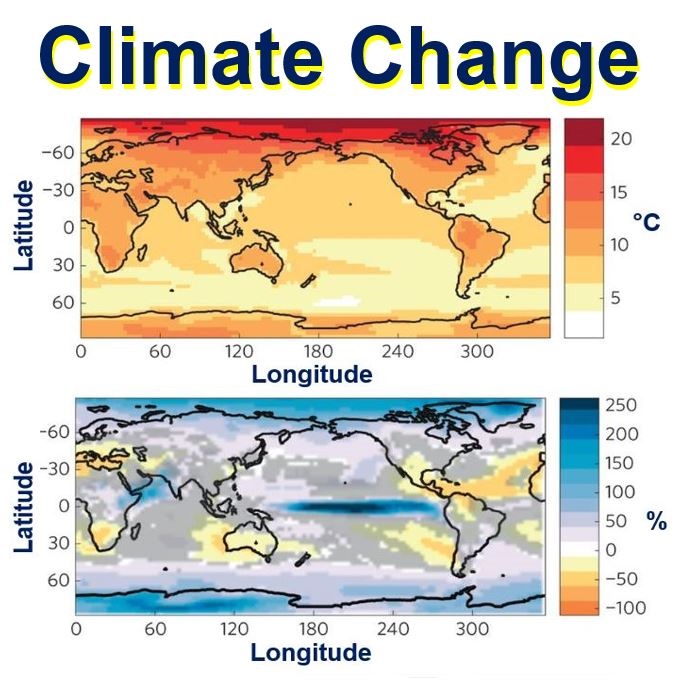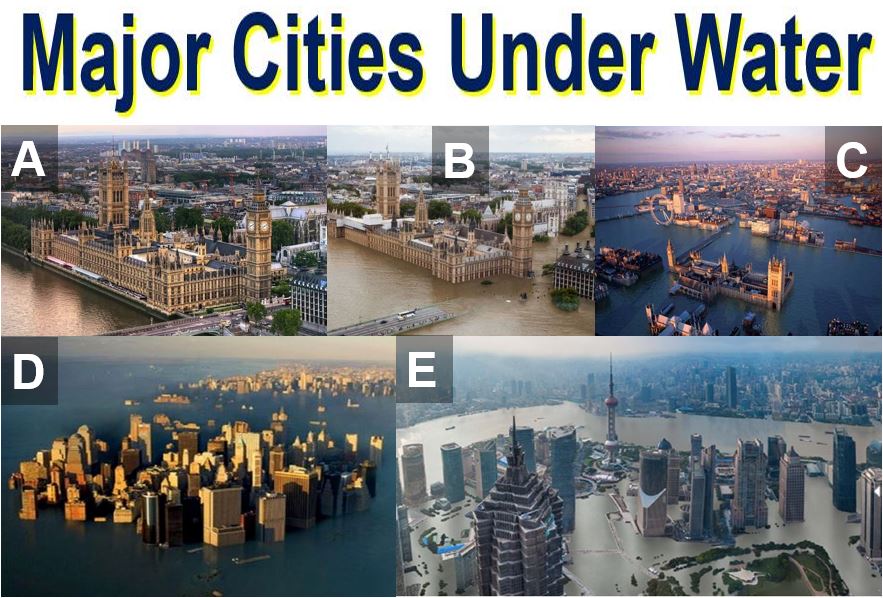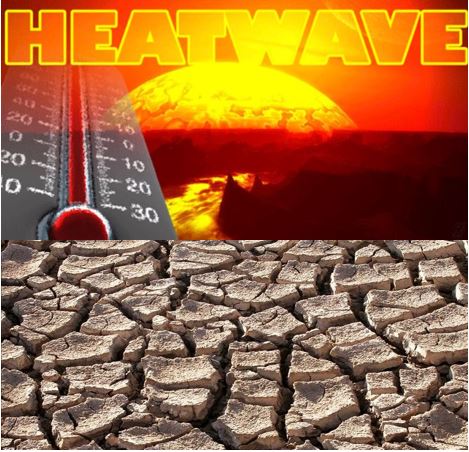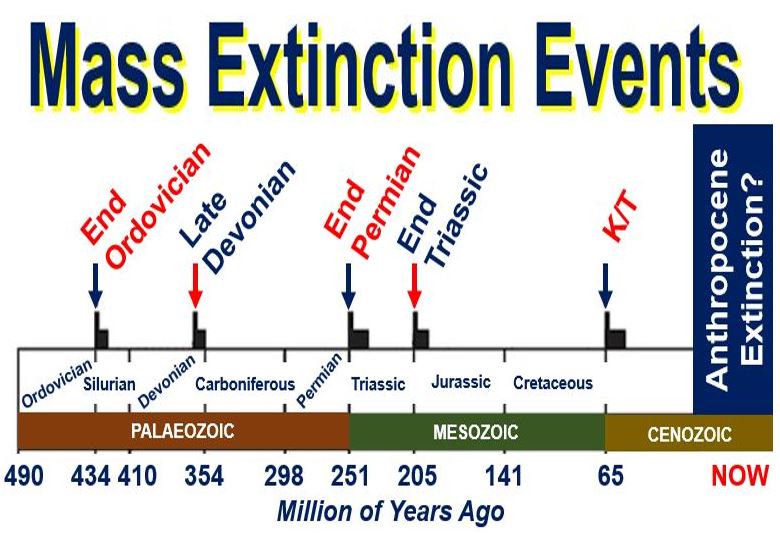If we burn all the fossil fuels left on our planet – all the oil, gas and coal – we will probably trigger another mass extinction and experience considerably more extreme climate change than previously estimated, says a team of Canadian scientists. Our polar ice caps would definitely melt, sea levels would rise considerable, and there would be unbearable mega heatwaves. Many parts of the world would become uninhabitable.
Lead author, Katarzyna Tokarska, a climatology graduate student at the University of Victoria in Canada, and colleagues, wrote about their study and findings in the prestigious journal Nature Climate Change (citation below).
 (Top) Multi-model mean temperature change in response to 5 EgC CO2 emissions, with respect to the pre-industrial control simulation. (Bottom) Multi-model mean precipitation response to 5 EgC CO2 emissions. (Image: nature.com)
(Top) Multi-model mean temperature change in response to 5 EgC CO2 emissions, with respect to the pre-industrial control simulation. (Bottom) Multi-model mean precipitation response to 5 EgC CO2 emissions. (Image: nature.com)
Fossil fuel industry argument no longer valid
Supporters of the oil & gas and coal industries, and those against renewable energy, argue that there are plenty of fossil fuels still to be exploited under the ground, and that we do not need to ween ourselves off them.
According to the new findings in this latest study, that argument may no longer be valid.
The scientists, from the University of Victoria and and Simon Fraser University, both in Canada, estimated what would happen if no further action were taken to combat the effects of climate change, and found ‘catastrophic results’ in terms of sea levels, precipitation and temperature.
In fact, they found that if we continue business as usual – making no effort to switch from fossil fuels to renewables – many parts of planet Earth would become uninhabitable.
 (A) London now, (B, C) London with 2°C to 4°C global temperature rise, (D) New York and (E) Shanghai. This is what these cities would look like with global temperature rises of up to 5°C. They would look considerably worse if temperatures rose by 9.5°C, which this study predicted would happen if we burnt all our fossil fuels and did not switch to renewables.
(A) London now, (B, C) London with 2°C to 4°C global temperature rise, (D) New York and (E) Shanghai. This is what these cities would look like with global temperature rises of up to 5°C. They would look considerably worse if temperatures rose by 9.5°C, which this study predicted would happen if we burnt all our fossil fuels and did not switch to renewables.
The authors believe that now is the time for change when it comes to our energy generation and consumption behaviours.
Even a conservative estimate is ‘shocking’
Given that it is virtually impossible to guess accurately how many fossil fuels remain, for their study the scientist used a figure at the lower end of estimates – 5 trillion tons of emitted carbon.
They then extrapolated what would be likely to occur if we continued generating and consuming energy without trying to switch to alternative fuel sources.
They were shocked with their findings. Average temperatures across our planet would increase by up to an astonishing 9.5°C (49.1°F). In the Arctic and some other more vulnerable regions, temperatures could rise by up to 19.5°C (67.1°F).
If this were to happen, our polar ice caps would definitely melt, and sea levels would rise considerably. Hundreds of millions of people would find their habitats submerged below water – the Netherlands, Bangladesh, Florida, East Anglia in England, the Yucatan Peninsula in Mexico, and many other areas across the planet would find most of their territory covered with seawater.
Add to this the mega heatwaves that would kill many life forms in the Middle East, some Mediterranean Countries, parts of Africa, Central America, Australasia and the Amazon rainforest, and we would have an unimaginable ecological catastrophe.
 Some parts of the world will become so hot and dry that people will no longer be able to live there, neither will many other life forms.
Some parts of the world will become so hot and dry that people will no longer be able to live there, neither will many other life forms.
The authors also estimated that the tropical regions in the Pacific Ocean would see rainfall increasing by a factor of four.
A wake-up call
Ms. Tokarska said their findings should be seen as a wake-up call, a trigger to get us to take decisive and immediate action against climate change.
Ms. Tokarska said:
“It is really important to know what would happen if we don’t take any action to mitigate climate change. Even though we have the Paris climate change agreement, so far there hasn’t been any action. [The latest study] is a warning message.”
 The Anthropocene Extinction, also known as the Sixth Extinction or Holocene Extinction, is the name for the currently ongoing extinction event of species, mainly due to human activities. Are we the cause of the next mass extinction? Probably, if we continue burning fossil fuels and do not switch to renewable energy sources.
The Anthropocene Extinction, also known as the Sixth Extinction or Holocene Extinction, is the name for the currently ongoing extinction event of species, mainly due to human activities. Are we the cause of the next mass extinction? Probably, if we continue burning fossil fuels and do not switch to renewable energy sources.
In an Abstract which describes the journal’s main paper, the scientists wrote:
“These models simulate, in response to 5 EgC of CO2 emissions, global mean warming of 6.4–9.5 °C, mean Arctic warming of 14.7–19.5 °C, and mean regional precipitation increases by more than a factor of four.”
“These results indicate that the unregulated exploitation of the fossil fuel resource could ultimately result in considerably more profound climate changes than previously suggested.”
Citation: “The climate response to five trillion tonnes of carbon,” Andrew J. Weaver, Katarzyna B. Tokarska, Nathan P. Gillett, Vivek K. Arora and Michael Eby. Nature Climate Change. May 2016. DOI: 10.1038/nclimate3036.
Video – The Anthropocene Extinction
This short animation highlights the devastating effects of the Anthropocene extinction.
